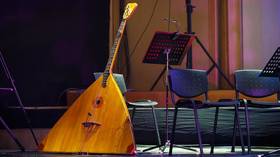Balalaika compared to swastika


The organizers of a concert in support of Ukraine in Uppsala, Sweden were forced to cancel a performance by folk music group Sodra Bergens Balalaikor last week, after reportedly facing backlash from Swedish fans for including the balalaika – a traditional Russian triangular three-stringed instrument that is often associated with Russia and Russian culture.
Sodra Bergens Balalaikor is an amateur orchestra, formed in 1969, that consists of about twenty people who play Russian, Ukrainian, and Swedish folk music and feature traditional folk instruments, primarily the balalaika.
Jonas Nyberg – one of the members of Sodra Bergens Balalaikor – says he was extremely perplexed by the accusations labeled against the group, after several critics claimed that featuring the balalaika in a concert in support of Ukraine was “sacrilege” while some even went as far as to compared the instrument to a swastika.
“You can have sympathy because people are upset and angry in this situation. But the argument gets a little weird. We are not Russians, we just happen to play Russian instruments, as we have done all these years. Our Ukrainian musician friends are also baffled,” Nyberg said.
After the group’s concert in Uppsala was canceled, they also decided to voluntarily postpone a concert in Rimbo the same weekend, where they were supposed to play together with students from a local cultural school.
The move comes as a large number of Western institutions have started targeting Russian-linked works of art and culture since Russia launched its military operation in Ukraine.
London’s National Gallery officially renamed an 1890s painting by Edgar Degas, changing it from ‘Russian Dancers’ to ‘Ukrainian Dancers’. The Cardiff Philharmonic Orchestra in Wales removed Pyotr Tchaikovsky’s famous 1812 Overture, claiming it was “inappropriate,” while a university in Milan, Italy tried to suspend a course on acclaimed Russian novelist Fyodor Dostoevsky, saying it was trying to avoid tensions by focusing on Ukrainian authors instead. After a public backlash, the decision was reversed.